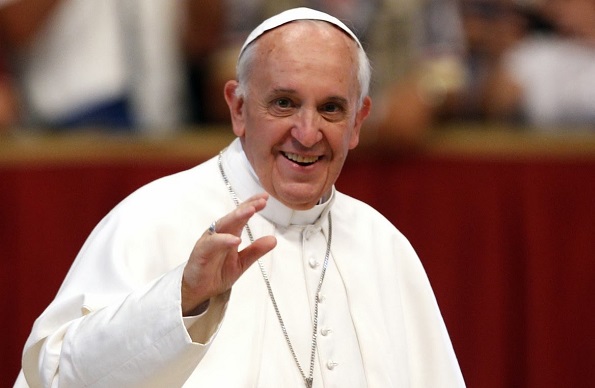
Pope Francis on pilgrimage of peace to DR Congo, South Sudan
Pope Francis last Tuesday embarked on a six-day visit to the Democratic Republic of Congo (DRC) and South Sudan, two fragile African nations, which are often forgotten by the world, where protracted conflicts have left millions of refugees and displaced people grappling with hunger.
Pope Francis’ visit to the two African nations marks his 40th Apostolic Journey abroad, and the fifth, to Africa. Both countries have large Catholic populations and are rich in natural resources — DRC in minerals and South Sudan in oil — but beset with poverty and strife with the DRC being the second-largest country in Africa after Algeria.
Half of the population
The January 31-February 5 visit to the Democratic Republic of Congo (DRC) and South Sudan takes the 86-year-old Pope to places where Catholics make up about half of the populations and where the Church is a key player in health and educational systems, as well as in democracy-building efforts.
In 2015, he went to Kenya, Uganda and the Central African Republic and in 2017, he visited Egypt. Then, in March 2019, he made an Apostolic Journey to Morocco and later to Mozambique, Madagascar and Mauritius in September 2019.
The 86-year-old had to postpone the trip last year after suffering knee problems. But he was determined to undertake the visit, which will bring to 10 the number of African countries he has
so far visited. His trip to the DRC will be the first papal visit since Pope John Paul in 1985 when the country was then called Zaire.
95 million people
In the Democratic Republic of Congo, close to half of its 95 million people — are Catholics. And for many people, the church functions like the states. DRC has the highest number of Catholic health centres in Africa and its bishops have a lot of social and political influence. So the conflicts there and in South Sudan are really at the core of this visit. And the Pope has called this his pilgrimage of peace.
The Argentine-born pontiff made his first trip to Africa in November 2015, with a six-day visit to Kenya, Uganda and Central African Republic (CAR).
On the first day of his apostolic journey, in Kinshasa, Democratic Republic of Congo, Pope Francis denounced the "poison of greed", which was driving conflicts in Africa, saying the rich world had to realise that people were more precious than the minerals in the earth beneath them.
Tens of thousands of people cheered as he travelled from the airport into the capital Kinshasa in his Popemobile, with some breaking away to chase it while others chanted and waved flags.
But the joyous mood, one of the most vibrant welcomes of his foreign trips, turned sombre when Pope Francis spoke to dignitaries at the presidential palace. He condemned "terrible forms of exploitation, unworthy of humanity" in Congo, where vast mineral wealth had fuelled war, displacement and hunger.
Hands off Africa
"Hands off the Democratic Republic of the Congo. Hands off Africa. Stop choking Africa; it is not a mine to be stripped or a terrain to be plundered," Francis said.
Congo has some of the world's richest deposits of diamonds, gold, copper, cobalt, tin, tantalum and lithium, but those have stoked conflict between militias, government troops and foreign invaders. Mining has also been linked to the inhumane exploitation of workers, including children and environmental degradation.
"It is a tragedy that these lands, and more generally the whole African continent, continue to endure various forms of exploitation," the Pope said, reading his speech in Italian while seated.
5.7 million displaced
An estimated 5.7 million people are internally displaced in Congo and 26 million face severe hunger, largely because of the impact of armed conflict, according to the United Nations and the Pope criticised rich countries for ignoring the tragedies unfolding in Congo and elsewhere in Africa.
"One has the impression that the international community has practically resigned itself to the violence devouring it (Congo). We cannot grow accustomed to the bloodshed that has marked this country for decades, causing millions of deaths," he said.
Tshisekedi made a similar point: "While the international community has remained passive and silent, more than 10 million people have been horribly killed."
On Wednesday, Pope Francis celebrated Mass at a Kinshasa airport that drew more than a million people. He later met with victims of violence from the east.
Trip to South Sudan
Francis will stay in Kinshasa until Friday morning, when he will fly to South Sudan, another African country grappling with conflict and poverty and he will be accompanied for that leg of his journey by the Archbishop of Canterbury, leader of the global Anglican Communion, and by the Church of Scotland Moderator. The religious leaders have described their joint visit as a
"pilgrimage of peace" to the world's youngest nation.
South Sudan gained independence in 2011 from predominantly Muslim Sudan after decades of conflict. Two years later, inter-ethnic conflict spiralled into a civil war that killed 400,000 people. A 2018 deal stopped the worst of the fighting.
An open-air Mass
The atmosphere was jubilant on the second day of Pope Francis’s visit to the Democratic Republic of Congo, as the pontiff celebrated an open-air Mass with a choir and a million faithful singing and dancing to church music.
The Catholic Church is witnessing its fastest growth in Africa (recent statistics show 2.1 per cent growth between 2019 and 2020). Out of a global population of 1.36 billion Catholics, 236 million are African (20 per cent of the total).
African Catholics are not simply growing in number. They are reinventing and reinterpreting Christianity. They are infusing it with new language and spiritual vibrancy through unique ways of worshipping God.

